Mueller 'threatened Trump with subpoena' amid Russia probe
- Published
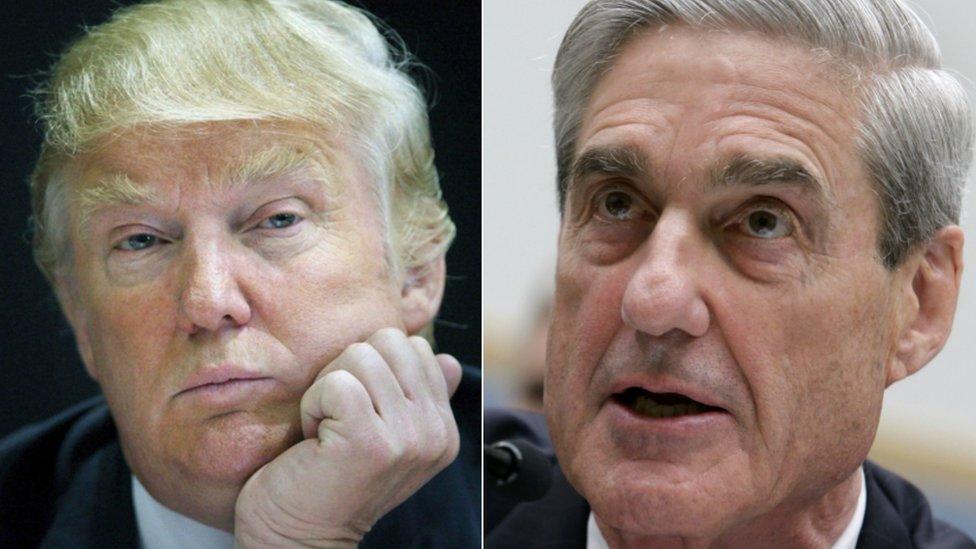
Mr Mueller (right) threatened to force Mr Trump to answer investigators' questions
Special Counsel Robert Mueller warned he could order Donald Trump to testify as part of a probe into alleged Russian election meddling, US media report.
It is believed to be the first time the special counsel has raised the possibility of issuing a subpoena.
Mr Trump has repeatedly denied collusion, and Russia has also denied the allegations.
Meanwhile, the lawyer who has been Mr Trump's main legal representative in the probe is to step down.
The White House said on Wednesday that Ty Cobb had been considering retirement for some time and had decided to go at the end of this month.
Mr Mueller suggested the threat of a subpoena, a court order forcing a witness to appear to give testimony, during talks with Mr Trump's lawyers in March.
It came after Mr Trump's lawyers insisted during the meeting that the president was under no obligation to face questions by federal investigators in relation to the Russia inquiry, the Washington Post reported.
However, Mr Mueller's team reportedly responded by suggesting they would issue a subpoena if Mr Trump declined. They agreed to provide the president's lawyers with more specific information about the questions they wished to ask Mr Trump.
All you need to know about the Trump-Russia investigation
The president's former lawyer, John Dowd, has also said that Mr Mueller mentioned the possibility of forcing Mr Trump to face questions.
Mr Dowd, who resigned about a week and a half after the meeting, said he told investigators that the probe was not "some game", adding: "You are screwing with the work of the president of the United States."
The list of possible questions has since been published in the New York Times, and it reportedly covers the president's motivations in dismissing former FBI director James Comey last May and his campaign's contacts with Russia.
Mr Trump repeated his claim that the Russia inquiry is a "witch hunt" on Wednesday.
Allow X content?
This article contains content provided by X. We ask for your permission before anything is loaded, as they may be using cookies and other technologies. You may want to read X’s cookie policy, external and privacy policy, external before accepting. To view this content choose ‘accept and continue’.

Explosive legal battle coming?
Anthony Zurcher, BBC News, Washington
If negotiations between Donald Trump's legal team and the special counsel's office have been a delicate dance, Robert Mueller just stomped on his counterpart's toes.
A subpoena to force the president before a grand jury could start an explosive legal battle that eventually reaches the US Supreme Court. Mr Trump and his lawyers may argue that a president can't be compelled to answer such wide-ranging questions.
The president has reportedly cooled on the idea of willingly meeting the special counsel - a result of his feeling that the Mueller team is out to get him. There have been hints that his legal advisers are torn on the matter.
John Dowd, who resigned in March as the president's top personal lawyer, was said to be against an interview. Others, including recent arrival Rudy Giuliani, appear more open to co-operation.
This may explain this week's spate of revelations. Possible Mueller questions, as compiled by the president's lawyers, were splashed across front page yesterday. The subpoena threat is today's news.
Mr Mueller's team remains tight-lipped, but the evolving strategies of the president's side are playing out nearly in full view - and they may be inclined to turn this dance into a rumble.

So will Mr Trump talk?
The US president himself has said he is willing to speak to Mr Mueller, but CNN reports that his enthusiasm has cooled after the offices of his personal attorney were raided.
The network cites sources close to Mr Trump as saying they are yet to make a recommendation about whether he agrees to an interview with Mr Mueller. Some advisers reportedly believe Mr Mueller would not go so far as to issue a subpoena.
If one was issued, Mr Trump's lawyers could fight it in court, or he could refuse to answer questions by pleading the Fifth Amendment, a constitutional protection against potential self-incrimination.
Prominent US lawyer, Alan Dershowitz, who has expressed support for Mr Trump in his legal battles, advised against the US president speaking to the special counsel.
"The strategy is to throw him softballs so that he will go on and on with his answers," he told the Washington Post.
"Instead of sharp questions designed to elicit yes or no, they make him feel very comfortable and let him ramble."
What is Robert Mueller investigating?
The special counsel is looking into Russia's efforts to interfere in the 2016 US election, whether there was any collusion between the Kremlin and Mr Trump's election campaign and whether the president unlawfully tried to obstruct the inquiry.
Mr Mueller was appointed special counsel following Mr Trump's firing of FBI director James Comey last May.
He was chosen by Deputy Attorney General Rod Rosenstein, after Attorney General Jeff Sessions recused himself due to undisclosed communications with the Russian ambassador.
Mr Rosenstein, who is the only Justice Department official with the authority to fire Mr Mueller, has been reportedly targeted for impeachment by House Republicans.
Speaking on Tuesday, he addressed the "people who have been making threats privately and publicly against me for quite some time".
US Deputy Attorney General rails against 'threats'
"I think they should understand by now the Department of Justice is not going to be extorted," he said.
The president has long insisted there was no collusion between his election campaign and the Russians.
US media reported that sources familiar with the case said Mr Mueller informed Mr Trump's attorneys in March that he is a subject of the investigations, but not a criminal target.
It remains unclear when Mr Mueller will request a meeting with the president.
- Published2 May 2018
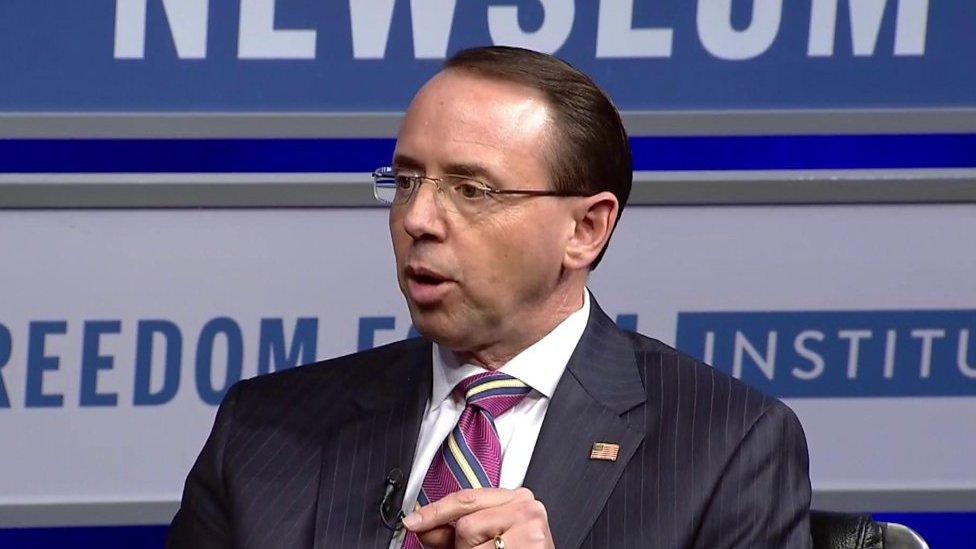
- Published1 May 2018
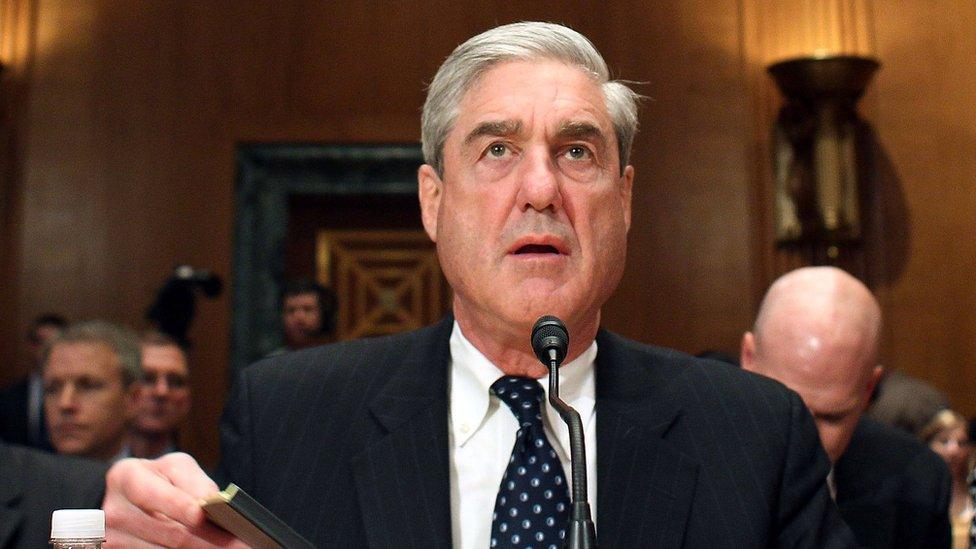
- Published22 March 2018
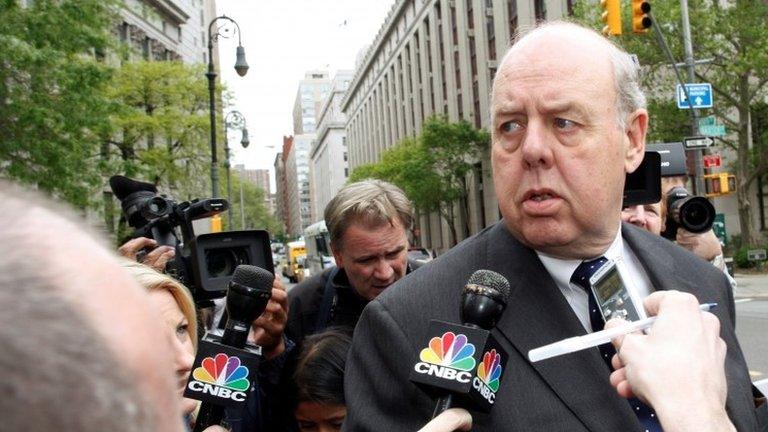
- Published2 May 2018
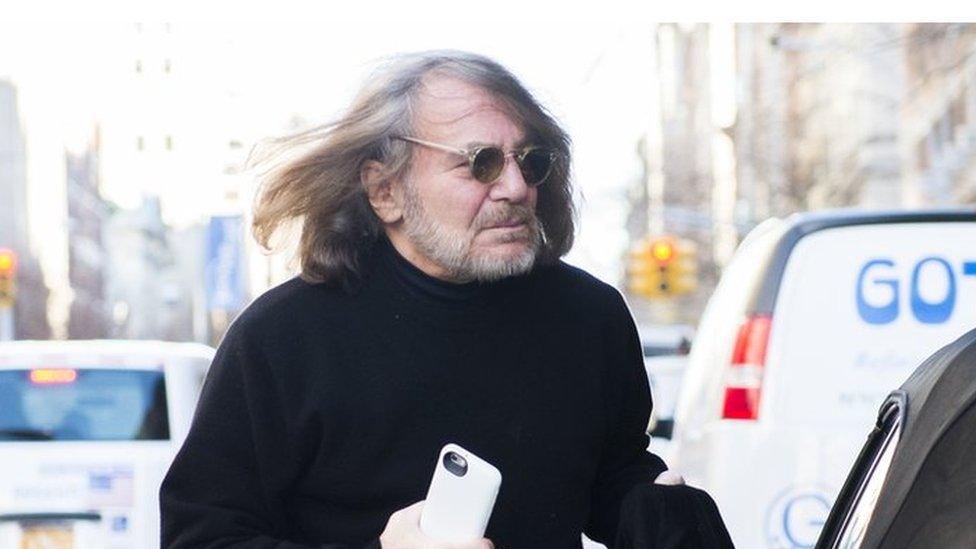
- Published16 April 2018
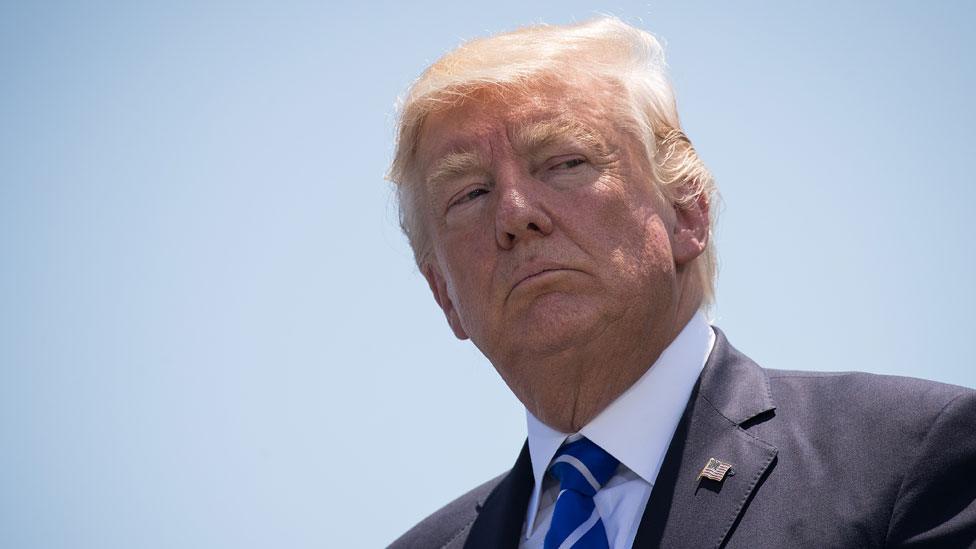
- Published11 April 2018